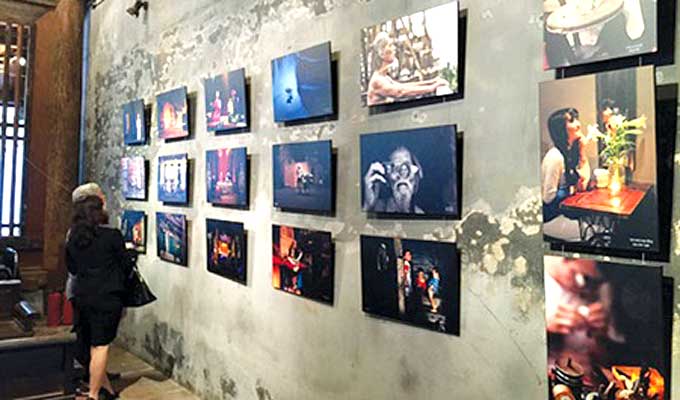A series of cultural activities to mark the Viet Nam Cultural Heritage Day (November 23) began last week at ancient sites in the Old Quarter and downtown HCM City.

This is an annual cultural event organized by the Management Board of Ha Noi's Old Quarter, in collaboration with artisans and painters to contribute to the cultural preservation, promotion and exchange of the Old Quarter, as well as to raise public awareness about heritage conservation.
According to Nguyen Thi Phan, the representative of the organisation board, an introduction and demonstration of traditional handicrafts was shown at Kim Ngan Temple, 42 Hang Bac Street.
The activity is an accompaniment to the exhibition entitled "Nhung nguoi giu net tinh hoa Ha Noi" (People who keep the quintessence of Ha Noi) by photographer La Bich, which runs from November 19-31.
The exhibition includes over 20 photos featuring people who continue to preserve handicrafts in the city, which is gradually disappearing.
"This is the second time I have come to Viet Nam, and the first time in Ha Noi. I came across the photos about artisans who are engrossed in their work and I was really impressed," said Akane Suzuki, a Japanese tourist.
"The exhibition has given me a beautiful insight into Ha Noi heritage, besides the people and scenery here. It will be a big loss to Ha Noi if these handicrafts vanish."
The introduction of Vietnamese tea culture by artisans and performances by the Ca tru Ha Noi Club, took place at the House of Heritage, 97 Ma May Street. In addition, lacquer products are also displayed here from November 20-23.
At the Ha Noi Old Quarter cultural exchange centre, 50 Dao Duy Tu Street, a water colour exhibition, entitled "Scenes of Singapore" by Singaporean artists, is running from November 20-27 to celebrate diplomatic relations between Viet Nam and Singapore. The event has attracted many domestic and foreign visitors to view and exchange cultures.
One of the most special activities celebrating Vietnamese Cultural Heritage Day, to be held today, is a ceremony to accept the rank certificate of the National Monument for Tu Thi Temple at 2A Yen Thai Street.
The people of Quat Dong Village, Thuong Tin District, Ha Noi, built the monument in the 16th century to commemorate the ancestor of embroidery, Le Cong Hanh (1606-61). In 2012, Tu Thi Temple was rated as a National architecture monument by the Ministry of Culture, Sports and Tourism.
"My families come from Thuong Tin and have pursued embroidery for a very long time. I have also been at this job for over 50 years. Although the number of handicraftsmen who maintain this profession isn't as high as before because of its low income, I believe it will never be forgotten," said Hoang Thi Duc, 76, a senior embroiderer in the city.
"My colleagues and I were very proud when Tu Thi Temple was recognised as a national cultural monument and our craft ancestor was also honoured. Thanks to him, Vietnamese embroidery has existed until now," Duc added.
"Cultural heritages are invaluable assets of Viet Nam, which has also made it unique and different from other countries," said Nguyen Minh Quang, 38, a tourist from Da Nang City.
"Preserving and honouring them are the duty of every citizen. I hope there will be more cultural heritages and artisans of Viet Nam will become highly appreciated."
Nguyen Dynasty
An exhibition showcasing 300 documents and artifacts related to imperial life during the Nguyen dynasty (1802 - 1945) has opened at the Southern Women's Museum in HCM City.
The exhibit include costumes, jewelry, make-up sets, musical instruments, kitchen sets and daily utensils made of diverse materials that illustrate the life of the royal and court families, especially women.
The exhibition highlights costumes worn by Queen Mother Tu Cung, whose son Bao Dai, the last king of Viet Nam, ruled from 1925 to 1945.
A collection of dining sets used by King Thieu Tri, the third emperor of the Nguyen dynasty who reigned from 1941-47, is also displayed.
Documents and photos about the life behind the Forbidden Citadel are also featured.
All items belong to museum and historical and cultural researcher Tran Dinh Son.
Son, who does research on post-Le and Trinh-Nguyen dynasties, said many relics and antiques belonging to the Nguyen dynasty had been damaged and lost, and the exhibition had sent a message on preserving the country's heritage to Vietnamese people, especially younger generations.
At the exhibition's opening ceremony on November 19, Son hosted a talk on life behind the walls of the Forbidden Citadel during the Nguyen.
He provided participants with general knowledge on organisation, education, cuisine, and entertainment in the citadel.
The exhibition will remain open until February 26 at 202 Vo Thi Sau Street in District 3.